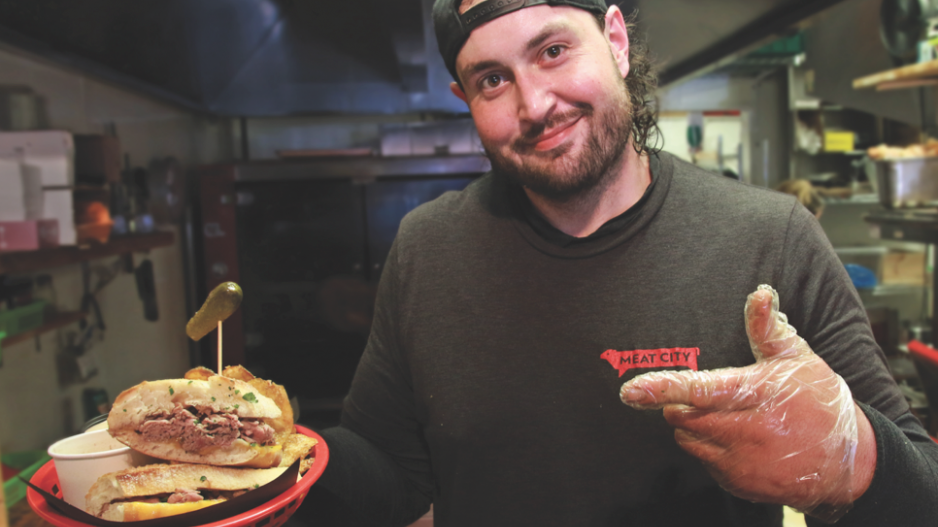Metro Vancouver restaurants are grappling with a host of issues that are threatening their long-term survival.
Atop their list of challenges is a massive labour shortage of everything from cooks and chefs to frontline staff.
They are also faced with high rents, shady investors, insufficient transportation, soured business deals and low worker retention in a marketplace where Visa Canada estimates 60% of Canadians now eat out at least once a week
The Cook Market Labour Analysis, done by Go2HR and supported by the provincial government, also found 73% of B.C. restaurants say they’re facing an immediate labour shortage; meanwhile, the demand for cooks and chefs is expected to increase 1.5% every year for the next decade. The study also found the majority of cooks and chefs would not recommend a career in the industry to friends or family.
Meat City owner Jon Hameister-Ries said he’s tried everything to retain staff at his Davie Street eatery in downtown Vancouver, including offering $20 an hour to entry-level employees. Hameister-Reis, who played for the Canadian Football League’s BC Lions from 2007 to 2012, started his restaurant in June 2015 after retiring from the game and making an appearance on Top Chef Canada.
Since then he’s encountered a host of issues, including a shadow investor making off with $100,000, food supply disputes, unusually high City of Vancouver water meter readings, which can cost $2,000 and more per month, and workers who come and go and steal from his cash register.
Hameister-Ries, who also owns part of Mean Poutine on Nelson Street, said the issues are common for restaurants in a city where tourism, hospitality and the dine-out culture are booming, but restaurant owners are struggling to make ends meet.
Customers, however, have never been an issue for his restaurants.
“It’s been bumping since Day 1,” Hameister-Ries said. “The real money is in catering orders, but that’s never been the issue, it’s everything else.”
According to Tourism Vancouver, international (12.2%), U.S. (9.4%) and Canadian (7.1%) tourism numbers are all up over the past year.
But Ian Tostenson, the president and chief executive officer for the BC Restaurant and Food Services Association (BCRFSA), said Meat City’s issues echo ones he hears daily from association members.
He said the labour shortage is hurting chain restaurants as much as local eateries, and demographics are playing a big part. According to the Cook Market Labour Analysis Report, most cooks or chefs retire between the ages of 35 and 44 after spending anywhere between 10 and 20 years in the industry.
Tostenson said the baby boomer retirement exodus means the industry can’t keep up with attrition, and the millennial generation appears to have little desire to get into the food industry.
“Twenty bucks an hour, that’s not a bad wage,” he said. “Lifeguards are making $20 to $25 an hour and forest firefighters as well. … It could be more systemic about getting people to work in this quick-service area. And – it’s so hard to say this politically correctly – but you really don’t see a lot of students who see it as something they want to do. So you’re seeing a lot of immigrant workers there right now.”
Joseph Richards Group chief executive officer Ryan Moreno said there is definitely a challenge when it comes to retaining talent within the industry.
“This is especially true of chefs and kitchen partners as the culinary industry is one of the most competitive around. More and more restaurants are trying to recruit top talent.”
Moreno added that to entice top talent he has to offer competitive compensation packages, flexibility and a commitment that employees will move up within the company quickly if they stay on. The Joseph Richards Group has 19 public houses, restaurants and liquor retail outlets in B.C. and Alberta.
Hameister-Reis said his “now hiring” sign is a permanent fixture on his storefront window.
“I’ve had the most success with foreign workers. But a lot of the kids, they’ll work a few days, then the weather will turn nice, they get a paycheque and they’re gone.”
According to a statement last year from federal Immigration Minister John McCallum, Canada must “substantially” increase its immigration numbers to keep up with retiring baby boomers and the labour shortage.
The high cost of leasing is also forcing Hameister-Reis to consider moving Meat City out of the downtown core. He added that transportation and parking are also issues for workers who have to commute for a shift.
Meanwhile municipal regulations and costs keep piling up for restaurant owners and operators. The most recent are the City of Vancouver’s new menu rules requiring restaurants to post the size and alcoholic content of drinks, which could force the entire local industry to reprint its menus.
Tostenson said all the regulations and policies create the feeling of drowning for most owners.
“We just want to be able to go and do what we do,” he said. “Get out of our way and stop piling stuff on and see what we can make out of this industry.”
Hameister-Reis, who discovered his love for cooking and barbecuing while on the BC Lions’ injured reserve list, said he just wants to run a restaurant that offers good food at a low cost. But it’s become a daily battle to stay in business even though he has a steady stream of customers and orders.
“If I knew what I was getting myself into in the start,” he said, “I’m not sure I’d do it again.” •




